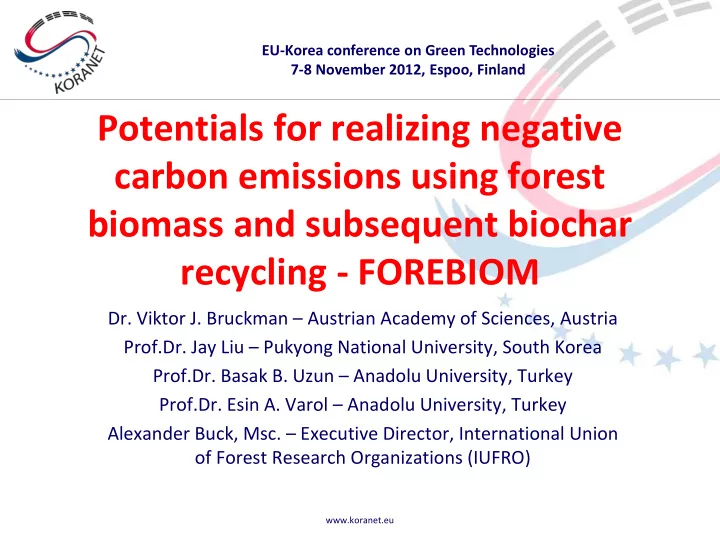

EU-Korea conference on Green Technologies 7-8 November 2012, Espoo, Finland Potentials for realizing negative carbon emissions using forest biomass and subsequent biochar recycling - FOREBIOM Dr. Viktor J. Bruckman – Austrian Academy of Sciences, Austria Prof.Dr. Jay Liu – Pukyong National University, South Korea Prof.Dr. Basak B. Uzun – Anadolu University, Turkey Prof.Dr. Esin A. Varol – Anadolu University, Turkey Alexander Buck, Msc. – Executive Director, International Union of Forest Research Organizations (IUFRO) www.koranet.eu
EU-Korea conference on Green Technologies 7-8 November 2012, Espoo, Finland General background • Increasing demands on Energy, renewable sources, decarbonization… • Forests play an important role in all member countries (source for raw materials, social and cultural value) • 65% forest cover in South Korea • 48% forest cover in Austria • 26% forest cover in Turkey, but 17.1% gain between 1990 and 2010 • 2010 IUFRO commitment to the “important role of forests for future generations” • Forest Bioenergy as one of the six key thematic areas for future development • Taskforce “Forest Bioenergy” www.koranet.eu
EU-Korea conference on Green Technologies 7-8 November 2012, Espoo, Finland The grand problem www.koranet.eu
EU-Korea conference on Green Technologies 7-8 November 2012, Espoo, Finland Vegetational fingerprint • Annual variations of atmospheric CO 2 indicates importance of vegetation in carbon sequestration • Sequestration of northern hemisphere causes a significant reduction (B) during vegetation period B • Surplus of atmospheric CO 2 (C) causes steady increase A in concentrations Forests are by far the most important • terrestrial C sink C 2010 2011 2012 www.koranet.eu
EU-Korea conference on Green Technologies 7-8 November 2012, Espoo, Finland Three arguments for the proposed approach 1. Substitution of fossil fuels with renewable resources (biomass) No additional CO 2 emissions • Local added value, „green jobs“, valorization of rural areas, Independent of global price • fluctuations, higher resilience of energy provision systems 2. C fixation during pyrolysis of woody biomass Charcoal (biochar) remains in the reactor – carbon compartments • Pyrolysis oil/gas can be used as source for energy (compatible to existing infrastructure) • 3. Recycling of biochar as a soil amendment Significantly increases soil properties and fertility • Consequently increases productivity and therefore CO 2 sequestration • 1. Forest biomass production 2. Biomass pyrolysis 3. Biochar recycling www.koranet.eu
EU-Korea conference on Green Technologies 7-8 November 2012, Espoo, Finland CO 2 emission scenarios combustion recycling Biomass Biochar Fossil Source Sink www.koranet.eu
EU-Korea conference on Green Technologies 7-8 November 2012, Espoo, Finland Focus in Focus in 1 2 Austria Turkey B) Biomass pyrolysis A) Forest biomass - Variation in feedstock production material and quality - Biomass potentials - Energy yields (bio-oil and - Environmental constraints bio-gas) - Soil nutrient extraction - Pyrolysis conditions - C sequestration (temperature, duration) - Water footprint and - Contaminants (PAHs, heavy hydrology metals, dioxins) - Forest management options - Process efficiency Biochar as a filter medium - Could biochar be used as a filter medium before application on forest sites? - Contamination - Applicability 3 C) Biochar recycling - Potential for negative emissions - Long term impact on soils, resilience - Impact on soil properties (e.g. CEC, nutrient retention, microbial habitat provision) Focus in - Economic applicability Korea www.koranet.eu
EU-Korea conference on Green Technologies 7-8 November 2012, Espoo, Finland Learning from ancient practices www.koranet.eu
EU-Korea conference on Green Technologies 7-8 November 2012, Espoo, Finland Objectives Combination of current state-of-the-art knowledge of each of the three steps Organization of scientific workshop series with keynote lectures and posters Supporting small-scale laboratory experiments with involvement of scientific mobility for early-stage researchers Publication of country case reports (in cooperation with IUFRO) Summary report (edited book, Interdisciplinary Perspectives series) Establishment of an on-line dossier (further reading, reports, project information…) Desicion support system focussing on criteria for the steps www.koranet.eu
EU-Korea conference on Green Technologies 7-8 November 2012, Espoo, Finland The challenges Forest Biomass production Biomass availability (sustainable amounts, demand of other industries, harvesting costs, • problems of mobilization) Ecological impacts (nutrient extraction, biodiversity loss, hydrological aspects, soil • biogeochemical implications) Biomass pyrolysis Optimal pyrolysis conditions (temperature, time, water content) • Feedstock material (physical and chemical composition of different plant species) • Contamination (PAHs, VOCs, dioxins…) • Costs (expected to decrease as a consequence of technological progress and proliferation) • Biochar recycling (Long-term) Recalcitrance of biochar against decomposition • Sudden change of soil chemical properties (pH, N limitation…) • Increasing rates of hetherotrophic soil respiration • www.koranet.eu
EU-Korea conference on Green Technologies 7-8 November 2012, Espoo, Finland Project Milestones www.koranet.eu
EU-Korea conference on Green Technologies 7-8 November 2012, Espoo, Finland Contact Details Dr. Viktor J. Bruckman (European project coordinator) Austrian Academy of Sciences, Vienna, Austria • www.oeaw.ac.at/kioes • Viktor.bruckman[at]oeaw.ac.at • Dr. Jay Liu (Korean project coordinator) Pukyong National University, Busan, Korea • http://myweb.pknu.ac.kr/Systems • Jayliu[at]pknu.ac.kr • Dr. Esin Varol and Dr. Basak Uzun (Turkish project partners) Anadolu University, Eskisehir, Turkey • http://www.kimya.anadolu.edu.tr/ • Eapaydin[at]anadolu.edu.tr; bbuzun[at]anadolu.edu.tr • Mr. Alexander Buck, Msc. CEO/Director, International Union of Forest Research Organizations, Vienna, Austria • www.iufro.org • Buck[at]iufro.org • www.koranet.eu
Recommend
More recommend